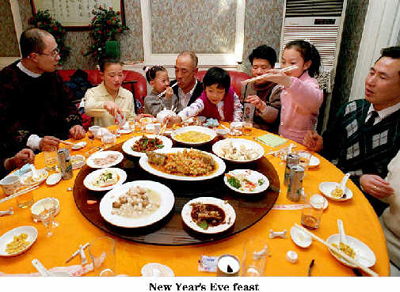Lunar New Year's Eve
 |
Several special traditions are associated with the New Year's Eve feast. First, it is a time when the entire family gathers together. Whether the meal is cooked and eaten at home or enjoyed at a restaurant, all members of the family, old and young, male and female, attend the feast. The evening before New Year's Eve, all visitors must return to their own homes for the New Year's celebration. A place setting is prepared at the table for any family members who are unable to get home for the holidays, symbolically filling their place in the family circle. Because it serves to bring the family together, the New Year's Eve feast is also called the Reunion Feast. After the meal, the adults give the children red envelopes containing gifts of New Year's money.
Second, the New Year's Eve feast includes a wide variety of delicious foods and drinks. After working hard all year, people can finally relax with their families and enjoy life. In some regions, it is traditional to drink a special kind of liquor, tushujiu, steeped with herbs, which is said to provide protection against disease in the coming year.
Third, the food served at the New Year's Eve feast has rich symbolic meaning. The dishes definitely include fish and chicken, since their Chinese names are homonyms for "abundance" and "good luck." In Taiwan, it is traditional to eat fish spheres (like meatballs, but made out of fish), whose round shape symbolizes the family circle and family reunions. The name for Chinese leek is a homonym for "a long time," so dishes made with Chinese leeks are eaten to symbolize long life. Turnips are another popular New Year's dish, because their name in Fujian dialect is a homonym for "good omen."
And of course, on New Year's Eve everyone must eat jiaozi, boiled dumplings.
Jiaozi (boiled dumplings stuffed with meat and vegetable filling) are also known as gengnian jiaozi (seeing in the new year dumplings). Although boiled dumplings have been a favorite food of the Chinese people for thousands of years, they have only been essential element of the lunar New Year's festivities since the Ming Dynasty. Jiaozi are the exact size and shape of the small gold ingots that were used for money in ancient China, so eating jiaozi satisfies the desire for wealth. Of course, jiaozi are also incomparably delicious, so on New Year's Eve, virtually everyone in China can be found eating this holiday dish. When vendors boil jiaozi to sell, they will often deliberately break one or two in the pot. But they do not remark upon this with taboo words, such as "break," "shatter," or "disintegrate." Rather, they say that the dumpling's filling has "burst," which in Chinese is a homonym for the auspicious phrase "to get rich."
There are many different regional customs concerning eating jiaozi to celebrate the lunar New Year. In some places, they are eaten on the last day of the year, and called tuanyuan jiaozi (reunion dumplings); in others they are eaten on New Year's Day and called nianfan (first meal of the new year). People in some regions traditionally eat jiaozi on the fifth day of the New Year. This day is known as Powu (Broken Fifth), so they are called powu jiaozi (Broken Fifth dumplings). And in some places, people eat jiaozi late into New Year's Eve and continue throughout New Year's Day, symbolizing continuing abundance from year to year. But the most common practice is staying up late on New Year's Eve wrapping, boiling, and eating dumplings to mark the transition between the old and new years. These jiaozi are called gengnian jiaozi (seeing in the New Year dumplings), signifying that the New Year will bring good luck and abundance.
On New Year's Eve, the house is brightly lit as the whole family stays up all night to see out the old year and see in the new. People do more than just sit around as they wait for the arrival of the New Year. There is plenty to eat and drink, including wine, cooked dishes, New Year's cake, boiled dumplings, fruit, and assorted snacks, and all kinds of games are played. Since it's nighttime, most of the games are played indoors. Popular games include Go, Chinese chess, card games, and mahjong. Before it gets dark, children ride bamboo horses, spin tops, and play games like "Eagle Catches Chicken" and "Blind Man's Bluff." As midnight approaches, the parents prepare the family altar. They then light incense and make offerings to the ancestors and auspicious deities, bringing the New Year's festivities to their peak. After the ceremony is over, everyone exchanges New Year's greetings and eats boiled dumplings. It is also traditional to set off fireworks and firecrackers on New Year's Eve. As it gets closer and closer to midnight, nonstop explosions fills the air and the sky is filled with a sparkling display.
Since the 1980s, it has become extremely popular to watch the annual "Spring Festival Gala Show" on television on New Year's Eve.
 0
0 







Go to Forum >>0 Comments